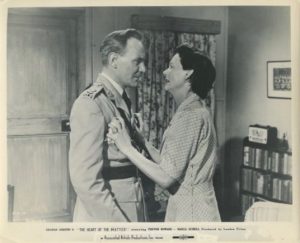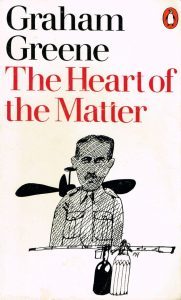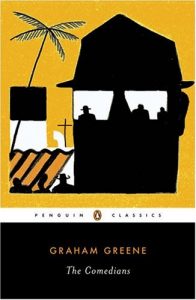The Heart of the Matter – Graham Greene – 1948

Posted by Steven on 2/8/2010, 21:26:53
The following questions are from Penguin’s website. There are some pretty good ones here.
DISCUSSION QUESTIONS
- How relevant is the setting to the action of The Heart of the Matter? How do the climate, the war, and the indigenous people of this remote colonial outpost affect Scobie, Louise, Helen, and Wilson? Is the novel implicitly or explicitly anticolonial?
- Scobie thinks that “no human being can really understand another, and no one can arrange another’s happiness” (p. 75). What are the fateful consequences of Scobie’s trying to make others happy? In what ways does the novel reveal the limits of our ability to understand one another?
- What kind of woman is Louise? Why is her love of literature so often regarded with derision in the novel? Why is she so upset when Scobie is passed over for the commissionership? To what extent is she responsible for Scobie’s downfall?
- What role does Yusef play in the novel? By what means does he entice Scobie into a corrupt relationship? Are we meant to see him as a diabolical character or merely as someone working the colonial occupation to his best advantage?
- In discussing mercy and damnation, Father Rank says, “The Church knows all the rules. But it doesn’t know what goes on in a single human heart” (p. 254). To what extent can The Heart of the Matter be read as a critique of the Catholic Church? In what ways does the novel show the workings of the human heart to be beyond the comprehension of Catholic doctrine?
- Early in the novel, Scobie promises to find a way to send Louise to South Africa, and we read that “He would still have made the promise even if he could have foreseen all that would come of it” (p. 50). What are the consequences of this promise? Why would Scobie still have made it, even if he could foresee the ruin that it would cause?
- In what ways is Wilson a foil for Scobie? How are the two men different? For what reasons does Wilson wish to destroy Scobie?
- How has the death of his only child affected Scobie and the decisions he makes throughout the novel?
- Why is Scobie so drawn to Helen? Why do they feel so “safe” in each other’s presence? Why does this sense of safety turn out to be so dangerous?
- In what ways do the subplots of spying and diamond smuggling parallel the novel’s central concern with relationships? In what ways is the novel about the tensions between openness and secrecy, honesty and deception?
- At the end of the novel, Father Rank says of Scobie, “It may seem an odd thing to say—when a man’s as wrong as he was—but I think, from what I saw of him, that he really loved God.” To which Louise replies: “He certainly loved no one else” (p. 255). Are these statements about Scobie true? Does he love God and no one else? If so, how can we explain the choices he has made—to commit adultery and finally suicide?
- After Pemberton’s suicide, Scobie thinks: “Suicide was for ever out of his power—he couldn’t condemn himself for eternity—no cause was important enough” (p. 83). Why does Scobie kill himself, even when he believes it will bring eternal damnation? How does he rationalize his suicide to himself? Should his suicide be considered self-sacrifice for the well-being of Helen and Louise? Is suicide his only choice? What else might he have done?
Posted by Steven on 2/8/2010, 22:12:20, in reply to “The Heart of the Matter”
Several of the questions were about aspects of the novel that I had been wanting to discuss:
: 1. How relevant is the setting to the action of TheHeart of the Matter?
: How do the climate, the war, and the indigenous people of this remote colonial outpost
: affect Scobie, Louise, Helen, and Wilson? Is the novel implicitly or explicitly anticolonial?
I really liked that Greene chose to use an exotic setting for The Heart of the Matter. He could just as easily have put a Scobie in London or Brighton, but using Sierra Leone as the setting provides an added dimension.
The anti-colonialism is fairly subtle. There’s nothing noteworthy about racial attitudes in the book. Even Scobie is, at best, benevolently paternalistic. What I found striking, though, was how little the war was impacting the colony. It has been said that Britain was more concerned with retaining her Empire than with defeating the Axis, and that is certainly reflected here by the fact that they’re sending an inspector to a minor colony instead of to the front lines.
: 3. What kind of woman is Louise? Why is her love of literature so often regarded with
: derision in the novel?
It’s very intriguing how the author introduces reading into the makeup of every character, and the only two characters who read literature are negative ones: Louise and Wilson. The banker’s reading is also made fun of, while Scobie and Helen don’t read much at all.
Reading, in these cases, is identified with pretense. Louise wants to belong to a higher social class. The banker wants to impress people with his bookshelves. Wilson wants to impress his colleagues, on the other hand, by hiding his love of poetry.
: 4. What role does Yusef play in the novel? By what means does he entice Scobie into a corrupt
: relationship? Are we meant to see him as a diabolical character or merely as someone working
: the colonial occupation to his best advantage?
Yusef is very much a biblical Satan. He attempts to sweet talk his way into Scobie’s good graces, then quickly seizes an opportunity to latch on to Scobie’s soul.
: 5. In discussing mercy and damnation, Father Rank says, “The Church knows all the rules. But it
: doesn’t know what goes on in a single human heart” (p. 254). To what extent can The Heart of
: the Matter be read as a critique of the Catholic Church? In what ways does the novel show the workings
: of the human heart to be beyond the comprehension of Catholic doctrine?
I’m not conversant enough with Catholic teaching to know if this should be taken as a criticism of Catholicism, but it is certainly a criticism of some Catholics. Even as a non-believer, I found Father Rank’s statements very moving.
: 9. Why is Scobie so drawn to Helen? Why do they feel so “safe” in each other’s presence? Why does
: this sense of safety turn out to be so dangerous?
I found Scobie’s and Helen’s love for each other to be the least convincing part of the novel. I think Greene was a bit awkward when it comes to describing sexual attraction. Scobie and Helen are just having a conversation when, all of a sudden, there’s a kiss. The same thing happened with Wilson and Louise, as well as with characters in Brighton Rock. Kisses come on unexpectedly like sneezes.
Posted by Lale on 12/8/2010, 8:43:31, in reply to “Re: The Heart of the Matter”
: I found Scobie’s and Helen’s love for each other to be the least convincing part of the novel.
I agree. It was the weakest link in the novel. It simply did not work.
I liked the book a lot. I was curious, I wanted to keep reading, it was interesting. The only thing I didn’t like was Scobie’s repetitions of how he wanted to make his wife (and then later, his lover) happy. He didn’t have to tell us that.
Lale
Posted by guillermo maynez on 3/8/2010, 12:11:38, in reply to “The Heart of the Matter”
Some answers:
: DISCUSSION QUESTIONS
:
: 1. How relevant is the setting to the action of The Heart of the Matter? How do the climate, the war, and
: the indigenous people of this remote colonial outpost affect Scobie, Louise, Helen, and Wilson?
: Is the novel implicitly or explicitly anticolonial?
George Orwell, in his review in “The New Yorker” says that the setting is irrelevant, that the natives play only a marginal, background role, and that it could have happened in London itself. I’m not so sure. I think there is plenty of a sense of isolation, for all the characters. Brief examples: Louise doesn’t have a real social life. Besides being socially unsuccessful, she has little chance of making friends of her own. Her choices are very limited. Scobie is a stranger in a strange land, overwhelmed by the parochial religiousness of Louise, with no worldly society. And Helen simply has no other choice but the drunkard soldiers and police officers. She also has no friends of her own. Plus, the tropics usually make foreigners go a little nuts.
: 2. Scobie thinks that “no human being can really understand another, and no one can arrange another’s
: happiness” (p. 75). What are the fateful consequences of Scobie’s trying to make others happy?
: In what ways does the novel reveal the limits of our ability to understand one another?
It’s certainly hard to understand other people’s motives, but when one has close, long-lasting, sincere relationships, one learns to better understand them. Inevitably, these people will be few, and relationships must be true and deep. Beyond that circle, playing hero or martyr is always a tricky game. And Scobie’s marital relationship is far from honest and open.
: 3. What kind of woman is Louise? Why is her love of literature so often regarded with derision in the
: novel? Why is she so upset when Scobie is passed over for the commissionership? To what extent is she
: responsible for Scobie’s downfall?
She is, in my opinion, one of those women (persons)with an extremely fragile sense of self-affirmation, plus a religious fanatic (i.e. also a sign of a very weak self) ((Sterling’s approach must be deeper)). She is responsible to the degree where she puts an overwhelming pressure on Scobie: “Wake up, go to Communion!”, “Loser!! You didn´t get the Commissionership!!”, “I can’t stand it here, I’ll go somewhere else”, etc. A woman like that may make a man crazy. If you don’t believe me, read the novel.
: 4. What role does Yusef play in the novel? By what means does he entice Scobie into a corrupt
: relationship? Are we meant to see him as a diabolical character or merely as someone working the
: colonial occupation to his best advantage?
Both.
: 5. In discussing mercy and damnation, Father Rank says, “The Church knows all the rules. But it
: doesn’t know what goes on in a single human heart” (p. 254). To what extent can The Heart of
: the Matter be read as a critique of the Catholic Church? In what ways does the novel show the workings
: of the human heart to be beyond the comprehension of Catholic doctrine?
The Catholic Church (within which I was brought up) is one of the most corrupt, vicious, and perverted institutions in History. It does know much about the human soul, hence her power at intimidation, manipulation, instillation of guilt, etc. , but that’s about it. I think the novel can be interpreted as a critique of it.
: 6. Early in the novel, Scobie promises to find a way to send Louise to South Africa, and we read that
: “He would still have made the promise even if he could have foreseen all that would come of it”
: (p. 50). What are the consequences of this promise? Why would Scobie still have made it, even if he
: could foresee the ruin that it would cause?
Because the situation was unbearable.
: 7. In what ways is Wilson a foil for Scobie? How are
: the two men different? For what reasons does Wilson wish to destroy Scobie?
Another man very insecure about himself. Another social outcast with a crush on a soul sister who also likes poetry. A stupid with initiative.
: 8. How has the death of his only child affected Scobie
: and the decisions he makes throughout the novel?
It is very common that the death of a child, whatever the cause, introduces a severe strain and stress on the marital relationship. It may strengthen the bond, but not infrequently, it produces mutual isolation and recriminations, expressed or repressed.
: 9. Why is Scobie so drawn to Helen? Why do they feel so “safe” in each other’s presence?
: Why does this sense of safety turn out to be so dangerous?
They are both wrecked in a deserted island. They have no one else to turn to. But deep down, they know they can’t make a happy couple.
: 10. In what ways do the subplots of spying and diamond
: smuggling parallel the novel’s central concern with
: relationships? In what ways is the novel about the
: tensions between openness and secrecy, honesty and deception?
In many ways. The context is a society completely devoid of social trust.
: 11. At the end of the novel, Father Rank says of Scobie, “It may seem an odd thing to say—when a
: man’s as wrong as he was—but I think, from what I saw of him, that he really loved God.” To which
: Louise replies: “He certainly loved no one else” (p. 255). Are these statements about Scobie
: true? Does he love God and no one else? If so, how can we explain the choices he has made—to
: commit adultery and finally suicide?
I don’t think he “commits adultery” He is abandoned by a woman who despises him, and he finds a soul mate. Who can he love? Where’s a person with whom Scobie can make a satisfactory, fulfilling relationship? That’s why I think the setting is not irrelevant.
: 12. After Pemberton’s suicide, Scobie thinks: “Suicide was for ever out of his power—he
: couldn’t condemn himself for eternity—no cause was important enough” (p. 83). Why does Scobie kill
: himself, even when he believes it will bring eternal damnation? How does he rationalize his suicide to
: himself? Should his suicide be considered self-sacrifice for the well-being of Helen and Louise?
: Is suicide his only choice? What else might he have done?
Scobie, both through his own decisions and external pressures, gets himself into what he sees, probably with reason, as an unresolvable problem. He feels trapped, cornered, lonely, despised, and, of course, this leads to a profound depression.
Posted by Sterling on 5/8/2010, 22:16:55, in reply to “Re: The Heart of the Matter”
: 9. Why is Scobie so drawn to Helen? Why do they feel so “safe” in each other’s presence?
: Why does this sense of safety turn out to be so dangerous?
I think there is a direct line from the dead daughter to the dying child to Helen. Scobie superficially appears to be completely over the death of Catherine. However, the scene with the dying little girl shows the depth of his feeling. “A memory that he had carefully buried returned…” He makes the rabbit shadow puppet in a desperate attempt to comfort the little girl and must be told that the child is dead. He then moves on to Helen. If I’m not mistaken, Catherine died about ten years previously at age nine. Helen is nineteen. Scobie sees his daughter in her. However, the fact that their relationship turns sexual is not explicitly incestuous, in my opinion. Helen is a healthy, athletic young woman who was recently married. I think that Scobie believes that the only way to save her from tawdry affairs with bounders like Bagster is to begin an affair with her himself.
: 11. At the end of the novel, Father Rank says of Scobie, “It may seem an odd thing to say—when a
: man’s as wrong as he was—but I think, from what I saw of him, that he really loved God.” To which
: Louise replies: “He certainly loved no one else” (p. 255). Are these statements about Scobie
: true? Does he love God and no one else? If so, how can we explain the choices he has made—to
: commit adultery and finally suicide?
Scobie does not appear to be capable of love for another human being. Perhaps that died with Catherine; perhaps he never had the capacity. Instead, he substitutes feelings of pity and responsibility. Pity is a corrosive feeling. It presumes that one is “better” than the person one pities. Someone who loves can feel sympathy, empathy, or compassion for their loved one. Pity is antithetical to love. If you are “better” than another, if you are filled with pride, you can not love them. Scobie can only “love” in the way that we love children (or pets). Maybe his love for Catherine is his only remaining model. The mature love of two equals is quite beyond him.
He thinks of pitying the planets (!). And by the end of the book, he appears to be pitying God. He thinks, “They [Louise and Helen] are ill with me and I can cure them. And you, too, God–you are ill with me.” And “they’ll be safe from me, Helen, Louise, and You [God].” God is lumped in with his rather pathetic women, whom he feels he must protect. This is something like delusions of grandeur. He has committed a commonplace sin. Not adultery, but taking communion while in a state of mortal sin. I’m no Catholic, but I imagine that takes place million of times a week. Yet Scobie believes that his sin is so important to God that He will sicken and be harmed. Wow.
: 12. After Pemberton’s suicide, Scobie thinks: “Suicide was for ever out of his power—he
: couldn’t condemn himself for eternity—no cause was important enough” (p. 83). Why does Scobie kill
: himself, even when he believes it will bring eternal damnation? How does he rationalize his suicide to
: himself? Should his suicide be considered self-sacrifice for the well-being of Helen and Louise?
: Is suicide his only choice? What else might he have done?
One of Scobie’s most shockingly heretical ideas is that Christ was the first Christian suicide, for how could mere men kill God? If God let himself be killed, is that not a form of suicide? (Every Sunday School student knows the answer, but apparently Scobie doesn’t.) Scobie’s thinking is: Since Jesus committed suicide, surely it’s OK for Scobie to do so. Especially since both deities (Christ and Scobie) offer their deaths up as sacrificial lambs for the salvation of others.
Of course, Christ changed the course of the world, and Scobie accomplished absolutely nothing, as the brief coda chapters make brutally clear.
Posted by Steven on 5/8/2010, 23:24:41, in reply to “Re: The Heart of the Matter”
One of the reasons it is great to have reading groups like this is to see a work from an entirely different perspective than our own. Though you are not a catholic, I suspect your judgement of Scobie is similar to that of a very orthodox Catholic. Do you think this is how the author intended us to judge him?
I wondered about Helen being a substitute for his dead daughter, but the fact of his having sex with her made that seem altogether too monstrous. All the same, what is there to like about Helen except her vulnerability?

Posted by Lale on 12/8/2010, 8:50:04, in reply to “Re: The Heart of the Matter”
He thinks of pitying the planets (!). And by the end of the book, he appears to be pitying God. He thinks, “They [Louise and Helen] are ill with me and I can cure them. And you, too, God–you are ill with me.” And “they’ll be safe from me, Helen, Louise, and You [God].” God is lumped in with his rather pathetic women, whom he feels he must protect. This is something like delusions of grandeur. He has committed a commonplace sin. Not adultery, but taking communion while in a state of mortal sin. I’m no Catholic, but I imagine that takes place million of times a week. Yet Scobie believes that his sin is so important to God that He will sicken and be harmed. Wow.
One of Scobie’s most shockingly heretical ideas is that Christ was the first Christian suicide, for how could mere men kill God? If God let himself be killed, is that not a form of suicide? (Every Sunday School student knows the answer, but apparently Scobie doesn’t.) Scobie’s thinking is: Since Jesus committed suicide, surely it’s OK for Scobie to do so. Especially since both deities (Christ and Scobie) offer their deaths up as sacrificial lambs for the salvation of others.
Of course, Christ changed the course of the world, and Scobie accomplished absolutely nothing, as the brief coda chapters make brutally clear.
I really enjoyed reading this, thank you.
Lale
Posted by Lale on 12/8/2010, 8:47:15, in reply to “Re: The Heart of the Matter”
: A stupid with initiative.
That is hilarious, you have found a good expression, I’ll use it for some people 😀
Posted by Lale on 15/8/2010, 23:09:19, in reply to “Re: The Heart of the Matter”
Well, I have read such meaningful things written by all of you and didn’t think I had much to add, but here we go:
First of all I liked the book a lot. The British life in the colony was interesting and the book held my curiosity as to what would happen and I really enjoyed the book.
I agree with Steven that the attraction between Scobie and the young woman was not delivered in a plausible way, I didn’t feel any chemistry between them. I also found it redundant that Scobie was constantly reminding us how he wanted to make people (especially these two women) happy.
I liked Scobie and wanted him to be happy. But there weren’t very many likable characters in the book. The Father was likable also, but the rest, no reader could have cared less about them.
I liked the setting. I agree with Steven that it added an extra dimension.
I like Graham Greene. I had also enjoyed his “A Burnt-out Case” which we had read here years ago. I found the two stories somewhat similar.
I find it very curious that people like Graham Greene and Muriel Spark (they were friends) can remain faithful to Catholicism while in their novels making a caricature of some of the more fundamentalist Catholics.
Lale


- Related:
- Book Reviews















